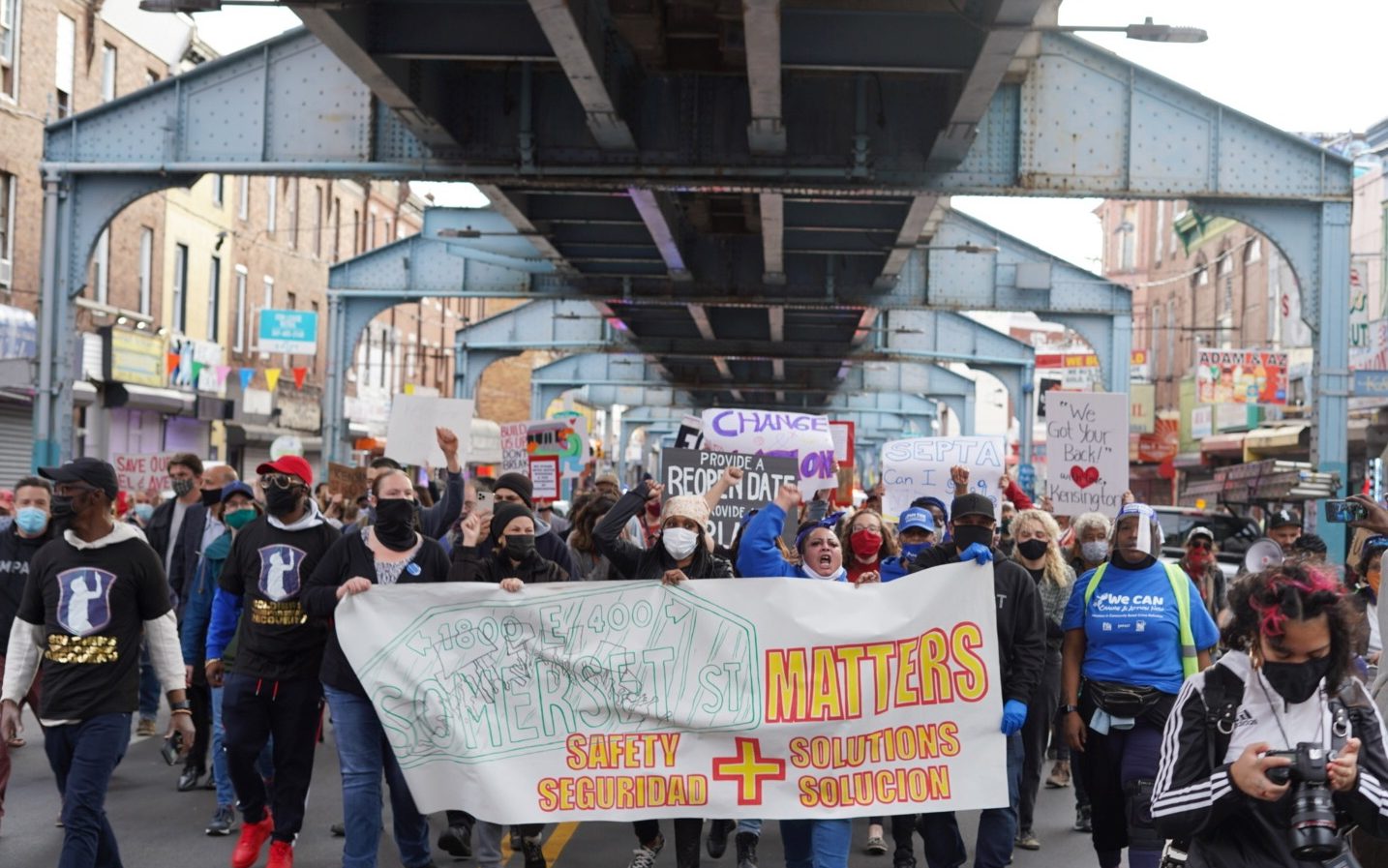Annual Grant Funds
- Racial & Economic Justice Fund — application deadline March 1, 2024
- Future Fund — application deadline March 1, 2024
- Gender Justice Organizing Fund — 2023 deadline has passed
- Phoebus Criminal Justice Initiative — 2024 deadline has passed
Upcoming Special Issue Funds
- Climate Justice Fund
- Parent & Caregiver Organizing Fund
- West Philadelphia Community Fund — deadline has passed
Rapid Response Fund
- Opportunity Fund — deadline is the first day of each month
Our Approach to Grantmaking
The core role of Bread & Roses is to bring together donors, community organizers, and other allies to move money into grassroots community organizing groups in the Philadelphia region.
All of the decisions on where the money goes are made by members of the community. We believe it is the people doing the work and impacted by injustice who know best where the money needs to go.
Our grants are funded by donors who give money each year to support local community organizing. We also serve as a partner to institutional and family foundations looking to direct their giving into the social justice movement.
- Must be located in Philadelphia, Bucks, Chester, Delaware, Montgomery, or Camden counties
- Must be designated by the IRS as a 501(c)3 organization or have a fiscal sponsor that is designated by the IRS as a 501(c)3 organization
- Must be current with all progress reports from previously awarded Bread & Roses grants
- Must submit a complete application prior to the deadline (because of the volume of applications we receive, we cannot make exceptions)
- Must be using community organizing to create sustainable social change
- A focus on community organizing and activism (not social service, self-help, or educational programs)
- A clear understanding of the root causes of the problem or issue that they are working to resolve
- A vision that emphasizes changing the systems that create or perpetuate the problem or issue being addressed
- A strategy that includes building a local base for taking collective action by the community affected by the problem or issue and results in concrete outcomes at the neighborhood, city, state or national level
- Leadership that is primarily composed of people most affected by the problem or issue that is being addressed
- Direct service work/social services, self-help/empowerment programs, educational programs, or advocacy
- Research
- Schools
- Capital campaigns or building projects
- Scholarships, fellowships, or grants to individuals (except through the Lax Scholarship Fund)
- People most affected by injustice are leaders, and the groups have broad membership and leadership bases that can survive when key leaders step down.
- They understand power differences and can talk about how they are trying to challenge power imbalances within their organizations and in their communities, as well as between community members and policy makers. They have a shared vision for what that change looks like and can articulate that vision.
- They prioritize ongoing education/consciousness raising for constituents and allies that broadens their membership base.
- They have a plan, including short term and long term goals that are specific, achievable, and relevant to the issue they seek to address and their overall vision for justice.
- They are knowledgeable about other organizations working on the same issue, and are able to work collaboratively across movements, issues, and communities to amplify impact.
- Because of their commitment to challenging power and prioritizing the leadership of marginalized people, they are less likely to be funded by more traditional funders; therefore, a grant from Bread & Roses Community Fund is critical to seeding or sustaining their work.
- Civil disobedience
- Mass protest
- Mobilizing community members to voice community concerns by attending meetings with or writing letters, sending emails, and making phone calls to public officials
- Mobilizing community members to pressure individual public officials to change their position on an issue
- Hosting town hall meetings and conducting listening projects or using other methods to gather community input on a particular issue with the intention of building a base of community members and taking collective action to create change at the policy or institutional level
- Training community members to disrupt harmful practices that government or corporate entities are using to maintain existing systems
- Creating alternatives to existing government or corporate systems or practices that are harmful and making those alternatives available in ways that have a measurable impact on the larger community
- Providing space for political education that builds the leadership and skills of members of an affected community, enabling them to analyze harmful systems, develop strategies for social change, and take collective action to create sustainable social change
Scholarships
- Jonathan Lax Scholarship Fund for Gay Men — deadline has passed.
Past Special Issue Funds
- Media Justice Fund — grants were made in 2023
- Neighborhood Equitable Recovery Fund — grants were made in 2021 and 2022
- Kensington Community Resilience Fund — grants were made in 2021 and 2022
- Environmental Justice Fund — grants were made in 2021
- Solidarity Fund for COVID-19 Organizing — grants were made in 2020 and 2021
- Equitable Public Space Fund — two-year grants were made in 2020
- Black Liberation Now Fund — grants were made in 2020
- Immigration Justice Fund — grants were made in 2019
- Black-led, Black-centered Organizing Fund — grants were made in 2018
- Resources for Racial Justice in Philly and Ferguson Initiative — grants were made from 2014 to 2017
- Latino Organizing Fund — grants were made in 2013
- Media Justice Fund — grants were made from 2007 to 2009
If you have questions about our grants and scholarships, contact grants@breadrosesfund.org. If you want to get updates when we put out calls for applications, subscribe to our email list.
